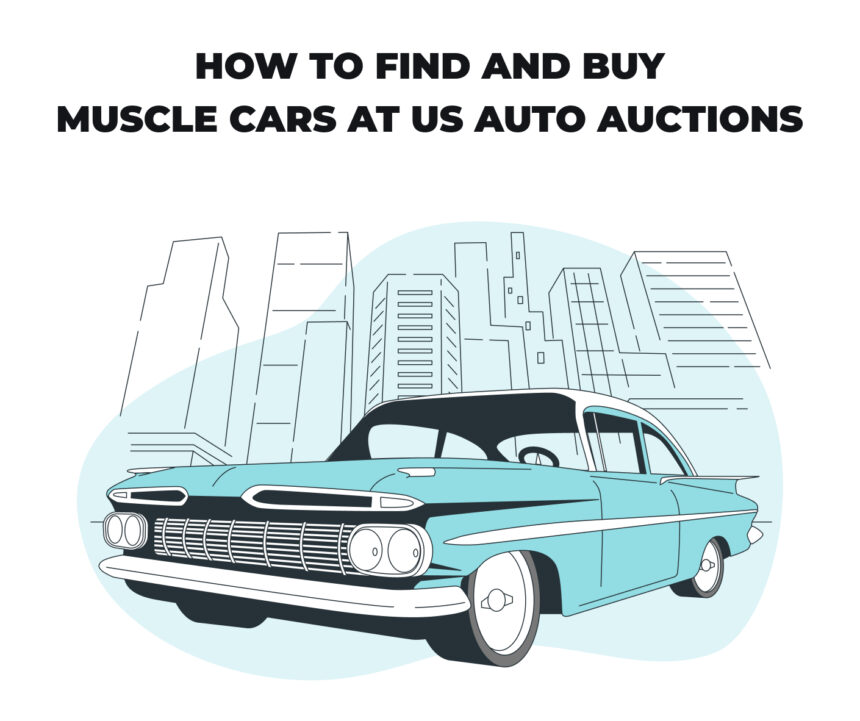Muscle cars have long stood as symbols of raw American power, speed, and automotive passion. Today, enthusiasts can find these iconic vehicles at US auto auctions, often at unbeatable prices. Whether you’re after a vintage classic or a modern-day powerhouse, auctions offer access to a wide range of options. But before placing a bid, it’s essential to verify the car’s condition and history. Platforms like en.bidfax.info provide detailed auction reports, photos, and VIN data to help you make an informed and safe purchase.
What Is a Muscle Car? Definition and Key Features
A muscle car is typically defined as a mid-size American vehicle equipped with a large V8 engine, rear-wheel drive, and an affordable price tag. These cars gained popularity in the 1960s and 1970s, offering drivers thrilling acceleration and aggressive styling without the luxury car price. Unlike sports cars designed for precision handling, muscle cars focus on straight-line speed and raw power.
Key features of classic muscle cars include powerful displacement engines (often exceeding 5.0 liters), bold exterior designs with long hoods and short rear decks, and performance-oriented tuning. Interior comfort and fuel efficiency were often secondary concerns. Today, many modern reinterpretations blend retro styling with advanced technology, appealing to both collectors and a new generation of drivers.
Advantages and Disadvantages of a Muscle Car
Owning a muscle car comes with undeniable perks. First and foremost is the sheer driving pleasure—instant torque, thrilling exhaust notes, and head-turning looks make every drive memorable. These cars also have strong resale value, especially among collectors, and evoke a sense of nostalgia that many American drivers cherish.
However, there are drawbacks. Muscle cars are known for poor fuel economy and, depending on the era, may lack modern safety features. Older models often require frequent maintenance and can be costly to restore. Insurance premiums may also be higher due to the performance specs. While newer muscle cars are more refined, they can still be impractical for daily commuting or winter driving.
Famous Muscle Car Models Through the Decades
The golden era of muscle cars began in the 1960s and introduced legendary models that still capture the imagination today. Among the earliest and most iconic was the 1964 Pontiac GTO, often considered the first true muscle car. Following closely were the Ford Mustang (especially the 1969 Boss 429), Chevrolet Camaro SS, Dodge Charger R/T, and Plymouth Road Runner.
The 1970s brought even more performance beasts like the Chevrolet Chevelle SS 454 and Dodge Challenger HEMI. However, rising insurance costs, stricter emissions regulations, and oil crises eventually led to the decline of the muscle car era by the late ’70s.
Despite the downturn, muscle cars never fully disappeared. The 1990s and 2000s saw a resurgence with modern versions of classics, such as the Ford Mustang GT, Dodge Challenger SRT Hellcat, and Chevrolet Camaro ZL1—now equipped with advanced tech but still true to their powerful heritage.

Are Muscle Cars Still Being Manufactured Today?
Yes, muscle cars are still alive and roaring. Brands like Ford, Dodge, and Chevrolet continue to produce performance-focused vehicles with the muscle car spirit. The Ford Mustang remains a top seller, recently evolving into both gas-powered and electric variants like the Mustang Mach-E.
Dodge has held firmly to tradition with models like the Challenger and Charger, offering supercharged engines like the Hellcat and Demon variants that push over 700 horsepower. Meanwhile, the Camaro remains Chevrolet’s tribute to classic performance, though its production is expected to pause in coming years.
Though the muscle car as we knew it in the ’60s is changing, the essence—bold, unapologetic power and street presence—continues in today’s vehicles, albeit with more advanced safety and efficiency standards.
Why Muscle Cars Hold a Special Place in American Hearts
Muscle cars are more than machines—they are cultural icons. For many Americans, they represent freedom, rebellion, and the thrill of open-road driving. They’re deeply tied to American history, often associated with blue-collar ingenuity and the golden age of Detroit manufacturing.
Generations grew up admiring these vehicles in movies, drag races, and weekend car shows. Their aggressive designs and thunderous engines make them stand out in a world of increasingly uniform vehicles. Even today, a well-maintained muscle car commands attention and respect on the road, making it a symbol of individualism and heritage.
Buying a Used Muscle Car at a US Auction
US auto auctions offer a unique opportunity to purchase muscle cars at lower-than-dealer prices. Platforms like Copart and IAAI list thousands of vehicles, including vintage and modern muscle cars that are unavailable elsewhere. Whether you’re looking for a restoration project or a nearly-new model, there’s often a wide selection.
However, the availability and quality can vary. Some listings may be flood-damaged, salvaged, or sold as-is with minimal information. That’s why it’s crucial to inspect the vehicle’s history carefully before bidding. Auctions can also be competitive, so understanding how the process works—and acting quickly—is key to securing the car you want.
What to Look for When Buying a Used Car from Auction
When purchasing a used car, especially a performance vehicle like a muscle car, due diligence is essential.
Key criteria include:
- Engine condition: Look for signs of wear or modification.
- Frame and body integrity: Check for previous accidents, rust, or hidden damage.
- Mileage and service history: Lower mileage often means longer life, but service records are equally important.
- Title status: Salvage or rebuilt titles can affect insurance and resale value.
- Tires, brakes, and suspension: Performance cars need quality parts to ensure safety.
It’s also advisable to estimate repair costs ahead of time and ensure the vehicle matches your state’s emissions and registration requirements.
The Importance of VIN Lookup Before Finalizing a Deal
A VIN (Vehicle Identification Number) is the key to a car’s entire history. Using it, buyers can access detailed records of accidents, ownership, title status, service logs, mileage, and auction data. Before buying a car at auction, especially a muscle car that may have been driven hard, a thorough VIN check is vital.
Services like en.bidfax.info help potential buyers access full reports that include photos, damage details, and even previous sale prices. This transparency can prevent costly mistakes and give you confidence in your bidding decisions. Never buy based on appearance alone—a clean VIN history is one of the strongest signals of a solid purchase.
Why Some Buyers Prefer to Remove VIN Data After Purchase
Once a muscle car is purchased and restored, some new owners prefer to remove or obscure VIN-based auction records from public platforms. There are several reasons for this:
- Privacy concerns: Not all buyers want public access to their ownership or purchase price.
- Resale value: A clean-looking vehicle with no visible auction history may fetch a higher price.
- Avoiding stigma: Cars marked as “salvage” or “rebuilt” may carry negative perception, even if fully repaired.
Using services that help clean up vehicle history from databases like en.bidfax.info allows owners to maintain control over how their car’s past is portrayed online—especially when the vehicle no longer resembles its former condition.
Conclusion:
Muscle cars remain a vibrant part of the automotive world—offering performance, nostalgia, and personality in every rev. Buying one through a US auction can be an exciting and cost-effective way to own a piece of history. However, due diligence is key: always inspect vehicle condition, check the VIN history using trusted platforms like en.bidfax.info, and understand the legal implications of your purchase.
For those who dream of driving an icon of American power, there’s never been a better time to explore the possibilities auctions offer—just make sure you’re as informed as you are passionate.













